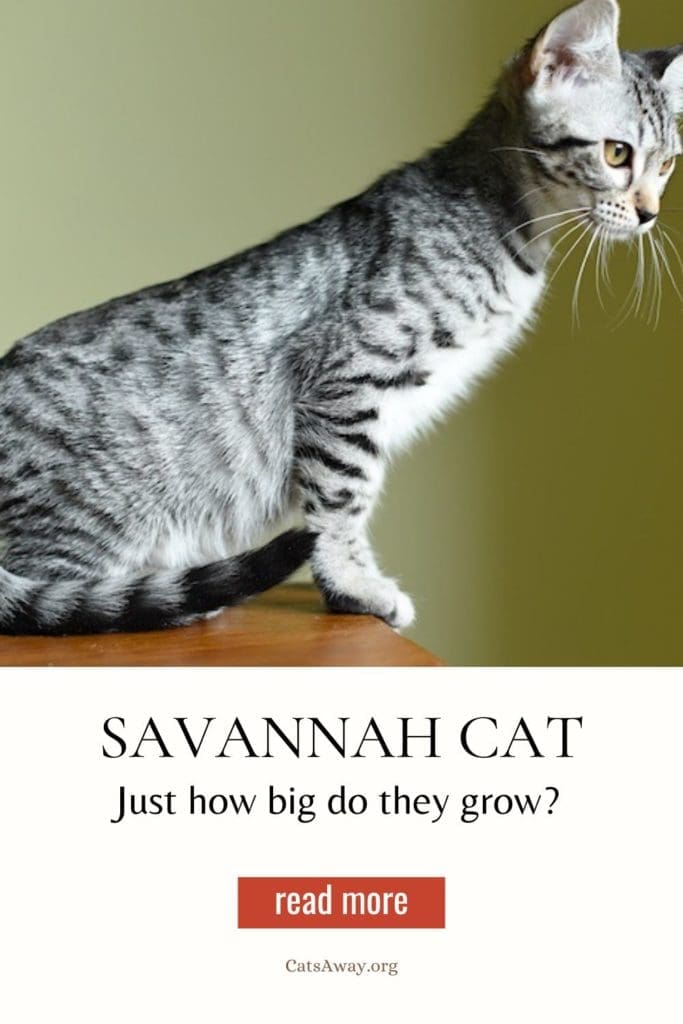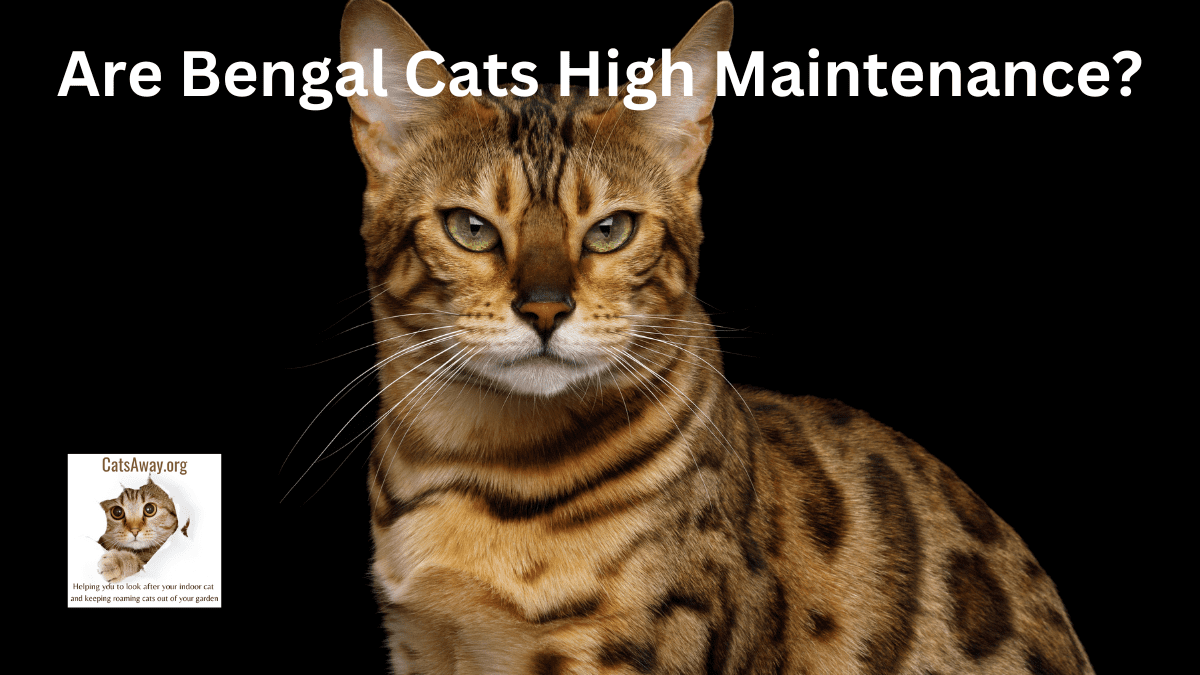When considering a Savannah cat size you should be aware that it varies depending on several factors, scubas their generation, age and gender. For example, males are typically larger than females.
A male Savannah cat can weigh anywhere from 12 to 25 pounds, while females usually weigh between 8 and 15 pounds.
The size of a Savannah cat will also depend on their generation. First-generation F1 Savannah cats, which have one African serval parent and one domestic cat parent, tend to be the largest. They can weigh up to 25 pounds and stand up to 18 inches at the shoulder.
Later-generation Savannah cats are typically smaller, with fourth-generation (F4) and fifth-generation (F5) cats being closer in size to other domestic cat breeds.
What is a Savannah Cat?
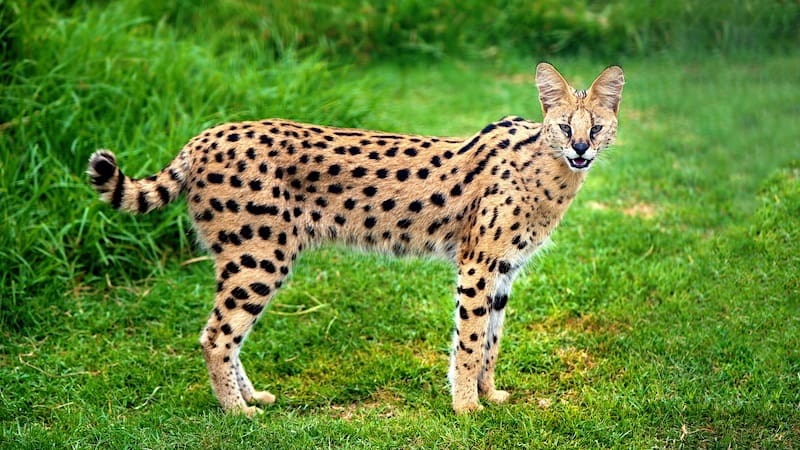
If you’re looking for a unique and exotic cat, the Savannah cat may be just what you’re looking for. These cats are a hybrid breed that is a cross between a domestic cat and a Serval, which is a wild African cat.
History
The first Savannah cat was bred in 1986 by Judee Frank, who crossed a male African serval with a Siamese cat. The resulting kittens were then bred with other domestic cats to create the Savannah cat breed we know today.
Since they were first bred, Savannah cats have become increasingly popular as pets. They are known for their unique appearance and playful personalities, and they make great companions for those who are looking for an exotic cat.
Savannah Cat Personality
As well as their distinctive appearance, Savannah cats are obviously known for their large size, with some individuals weighing up to 30 pounds. Their coats can range in color from golden brown to silver, and they often have black spots or stripes on their coats.
In addition to their size and appearance though, Savannah cats are also known for their playful personalities. They are active and curious cats that love to explore their surroundings. They are also very intelligent and can be trained to do tricks and are a cat breed that can easily be taught to walk on a leash.
If you’re considering getting a Savannah cat as a pet, it’s important to know that they require a lot of attention and care. They are high-energy cats that need plenty of exercise and mental stimulation. They also require a special diet that is high in protein and low in carbohydrates.
Do Savannah Cats Make Good House Pets?
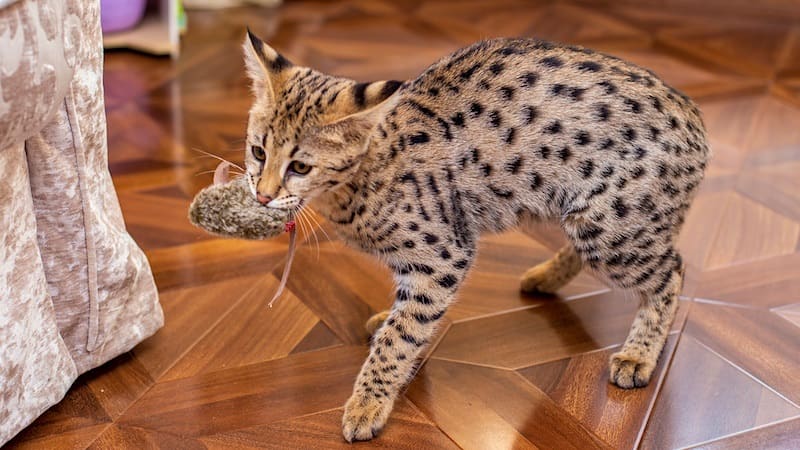
The answer is yes, Savannah cats can make great indoor pets, but it depends on their generation and individual personality.
First-generation Savannah cats are known to be more active and require more space to roam around, so they may not be the best choice if you live in an apartment. However, later generations tend to be more adaptable to indoor living and can thrive in smaller spaces.
It’s important to set aside time each day for some playtime and to provide your Savannah cat with plenty of toys, scratching posts, a cat tree, exercise wheel and other forms of enrichment to keep them mentally and physically stimulated. This can help prevent destructive scratching cat behavior and ensure they stay happy and healthy.
The Savannah is one of the breeds that would really benefit from a large outdoor cat enclosure or a catio attached to your home so they can get access to the outdoors at all times. Better yet, a secure cat proof garden so they can burn off their energy during the daytime in a safe environment.
Additionally, Savannah cats are known to be social and affectionate with their owners, so they may not do well if left alone for long periods of time. Consider adopting two Savannah cats or another pet to keep them company if you work long hours or are frequently away from home.
Overall, Savannah cats can make great indoor pets as long as you have the time to ensure their needs are met. With proper care and attention, they can be a loving and playful companion that can bring joy to your life for up to 20 years and more.
Is The Savannah Cat Hypoallergenic?
Savannah cats are not entirely hypoallergenic, but neither are they the worst cats for allergies as they produce less Fel d1 protein than other breeds, which is the protein that causes allergies in humans. This means that some people with mild cat allergies may be able to tolerate living with a Savannah cat.
However, it’s important to note that there is no such thing as a completely hypoallergenic cat, and some people with severe allergies may still have a reaction to Savannah cats.
If you have allergies and are considering getting a Savannah cat, it’s recommended that you spend some time around them to see if you have any allergic reactions before making a decision.
10 Reasons The Savannah Cat Makes A Great Indoor Cat
Here’s my top 10 reasons why Savannah cats can make great house cats:
They are highly intelligent and can be trained to do tricks and even walk on a leash.
Savannah cats are known to be very social and enjoy interacting with their owners and other pets.
They are loyal and affectionate, often bonding closely with their owners.
Savannah cats are generally healthy and have few genetic health issues.
They have a unique and exotic appearance that can be a conversation starter.
They produce less Fel d1 protein than other cat breeds, which makes them less likely to cause allergies in humans.
Savannah cats are active and playful, which can provide entertainment and exercise for their owners.
They are low-maintenance when it comes to grooming, as their short, dense coat requires minimal brushing.
Savannah cats have a longer lifespan compared to other cat breeds, often living up to 20 years when kept as house cats.
Despite being the size of a medium dog they have a smaller carbon footprint as their poop is smaller and easier to clean up.
Savannah Cat Sizes
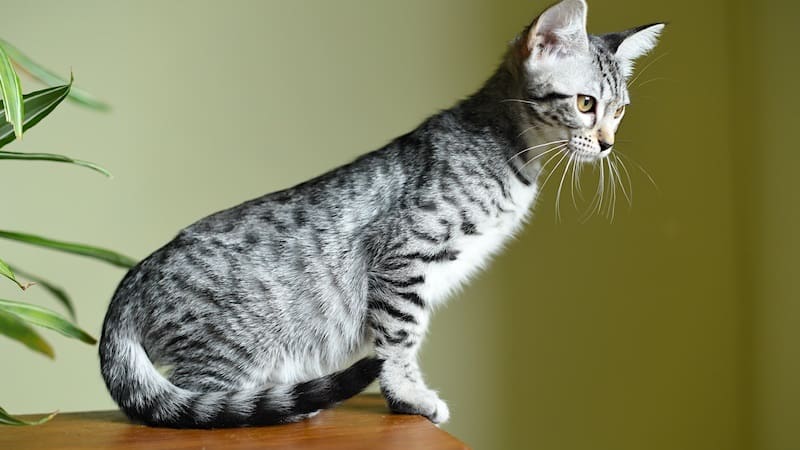
If you’re considering getting a Savannah cat, it’s important to know what size to expect as there are several Guinness world records held by this breed. Here’s what you need to know:
Average Size
The average size of a Savannah cat is between 12-25 pounds and around 14 inches tall. However, the size can vary depending on the generation and gender of the cat. Male Savannahs tend to be larger than females, and earlier generations tend to be larger as well.
Size Variations
There is a wide range of sizes for Savannah cats. Some cats can weigh as little as 3 pounds, while others can weigh up to 30 pounds. The height of a Savannah cat can also vary, with some cats being as short as 11 inches and others as tall as 18 inches.
Factors that Affect Size
Several factors can affect the size of a Savannah cat. The generation of the cat is one of the most significant factors. Earlier generations tend to be larger because they have more wild African Serval genes. So an F1 Savannah cat will generally be bigger than an F2 Savannah cat (second generation).
Other factors that can affect the size of a Savannah cat include diet, exercise, and genetics. Feeding your cat a healthy diet and providing plenty of opportunities for exercise can help ensure that they reach their full size potential.
The cat wheel below is designed and built for the largest cat breeds so is well suited for the Savannah.
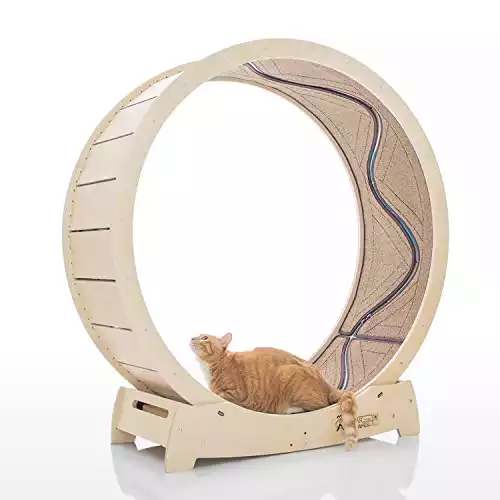 Extra Large Star Cat Wheel
Extra Large Star Cat Wheel
This is at least 10" taller than any other cat wheel and at 66lb can easily take a large cat or even several at a time if you're a multi cat household.
Despite the fact it can easily handle the biggest of cats its best feature is the luminous fish that travels inside the tube you can see within the wheel.
This keeps your cat's attention ensuring he gets plenty of exercise. Most cat owners have reported that they have to apply the brake so their cats don't overheat.
- Easily takes even the biggest breeds and wide enough for 2 cats
- The moving fish design keeps cats entertained and engaged.
- Star Cat Wheel is designed with safety in mind, minimizing gaps and featuring a pin-brake system to prevent accidents.
- The wide running track and golden ratio design make it easy for cats to run, spin, and scratch
- Super quiet
- The assembly process can be time-consuming
- At 66lbs its heavy to move around
Savannah Cat Growth
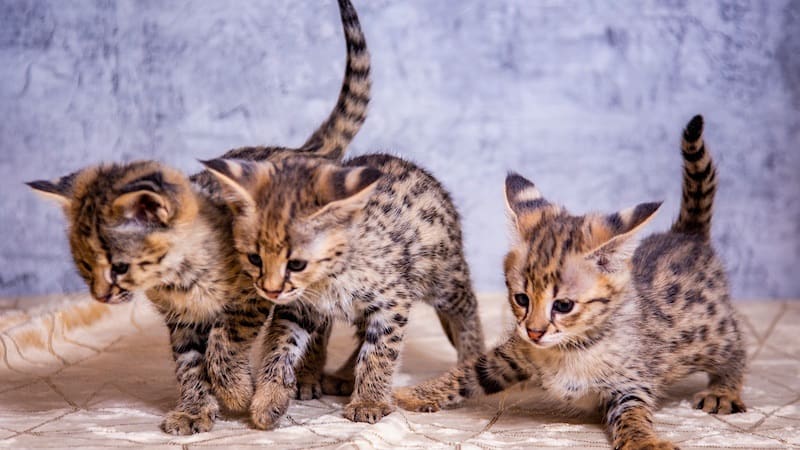
Savannah Kittens
When you first bring home a Savannah kitten, they will be small and light. They typically weigh between 3 to 10 pounds, depending on their generation. However, they grow quickly and can gain up to a pound per week during their first few months.
By the time they reach 6 months old, they will have reached about 50% of their adult weight.
During this time, it’s important to provide your kitten with a healthy diet that is high in protein and nutrients. This will help them grow strong and healthy. You should also make sure they get plenty of exercise and playtime to help them develop their muscles and coordination.
Adult Growth
As your Savannah cat reaches adulthood, their growth will slow down considerably. However, they will continue to fill out and develop their muscles until they reach their full size at around 3 years old.
Adult Savannah cats can weigh anywhere between 12 to 25 pounds, depending on their generation and gender.
Male Savannah cats tend to be larger than females, so keep this in mind if you are considering adopting one. It’s also important to note that Savannah cats that are more closely related to their wild Serval ancestors will typically be larger than those that are several generations removed.
To ensure your adult Savannah cat stays healthy and maintains their weight, it’s important to continue providing them with a healthy diet and plenty of exercise. You should also take them to the vet regularly for checkups and to monitor their weight and overall health.
How to Measure Your Savannah Cat
Measuring your Savannah cat’s size and weight is an important part of keeping track of their growth progress. Here are three main ways to measure your Savannah cat:
Using a Soft Measuring Tape: This is the most accurate and reliable way to measure your Savannah cat. Simply wrap the tape around your cat’s chest, just behind their front legs, and take note of the measurement.
The Belly Method: This method involves measuring the distance around your cat’s belly, just behind their front legs. Use a soft measuring tape and take note of the measurement.
The Withers Method: This method involves measuring your cat’s height at the withers, which is the highest point of their shoulder blades. Use a soft measuring tape and take note of the measurement.
It’s important to measure your Savannah cat’s size and weight once a week to keep track of their growth progress. You can use a pet scale to measure your cat’s weight, and using treats and positive rewards can help your Savannah cat learn to sit still on the scale.
Remember, Savannah cat size can vary depending on the generation and their individual genetics. While some Savannah cats can weigh up to 30 pounds and be as tall as 70 inches, others may be as small as a domestic cat. By measuring your Savannah cat regularly, you can keep track of their growth progress and ensure they are healthy and happy.
FAQ
How much does a savannah cat cost?
The cost of a Savannah cat can vary depending on several factors such as the generation, gender, age, coat color, and breeder. Generally, Savannah cats are considered one of the most expensive cat breeds due to their unique appearance, rarity, and the cost of breeding them.
The price of an F1 Savannah cat (first-generation hybrid with an African Serval cat) can range from $10,000 to $20,000 or more. F2 Savannah cats (second-generation hybrid) can cost between $4,000 to $8,000, while F3 Savannah cats (third-generation hybrid) can cost between $2,000 to $4,000. Later-generation Savannah cats (F4 and beyond) are more similar in price to other purebred cats and typically cost between $1,000 to $2,000.
It’s important to note that the cost of a Savannah cat doesn’t end with the purchase price. They require high-quality food, regular vet check-ups, and proper socialization and exercise, which can add up over time. Additionally, some states and countries have restrictions on owning Savannah cats, so it’s important to research local laws before making a purchase.
Are Savannah cats dangerous?
The answer to whether Savannah cats are dangerous or not depends on several factors such as the individual cat’s temperament, socialization, and training, as well as the owner’s ability to provide a safe and appropriate environment for the cat.
Savannah cats are known to be highly active, intelligent, and curious, which can make them challenging for novice owners who may not be able to provide the necessary exercise, socialization, and mental stimulation. If a Savannah cat is not properly socialized or trained, they can exhibit aggressive behavior towards humans or other animals.
However, with proper socialization and training, Savannah cats can make great pets and form strong bonds with their owners. They are generally not considered dangerous when they are well-cared for and provided with a safe and appropriate environment. It’s important for potential owners to do their research and understand the responsibilities and challenges of owning a Savannah cat before making a decision.
Is a Savannah Cat bigger than a Maine Coon cat?
Generally, Maine Coons are considered one of the largest domestic cat breeds, while Savannah cats are known for their tall and slender build.
Maine Coons can weigh between 13 to 18 pounds for females and 18 to 25 pounds for males, with some individuals weighing even more. They can grow up to 40 inches in length, including their tails, making them one of the longest domestic cat breeds as well.
Savannah cats, on the other hand, can weigh between 12 to 25 pounds when fully grown, with males tending to be larger than females. The height can range from about 12 to 18 inches at the shoulders, and they have a slender and athletic build.
Therefore, while Savannah cats can be tall and slender, Maine Coons are generally considered to be larger and heavier.
What is an F1 Savannah cat?
An F1 Savannah cat is a first-generation hybrid cat that is bred by crossing a domestic cat with an African Serval. The “F” in F1 stands for “filial,” and indicates the degree of separation from the original wild cat ancestor.
F1 Savannah cats have a serval parent and a domestic cat parent, and are therefore 50% serval and 50% domestic cat. They are the largest and most wild-looking of all Savannah cat generations, and may have traits such as long legs, large ears, and distinctive spotted coats.
F1 Savannah cats are known for their active and playful personalities, but they may also be more challenging to care for than later-generation Savannah cats due to their high energy levels and wild tendencies
Conclusion
Now that you know all about the Savannah cat size, you are better prepared to decide if this is the right breed for you. Keep in mind that Savannah cats can vary greatly in size and weight due to their generation, genetics, diet, and environment.
If you are looking for a large cat with an exotic look and a playful personality, a Savannah cat might be the perfect fit for you. Just be prepared for their high energy level and their need for lots of attention and playtime.
An alternative large cat is the Maine Coon breed which is known to have a much more laid back outlook on life. If the size of the Savannah appeals but a high energy cat doesn’t fit into your lifestyle, consider taking a look at the Maine Coon cat.
Remember to do your research and find a reputable breeder if you decide to give a Savannah cat a home for life. With proper care and attention, your Savannah cat can live a long and happy life as a beloved member of your family.
For more information on finding reputable breeders check out the Savannah Cat Association.

